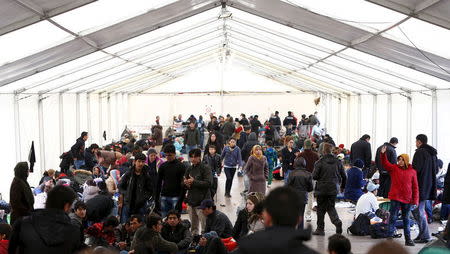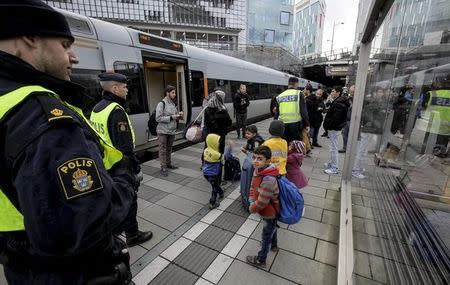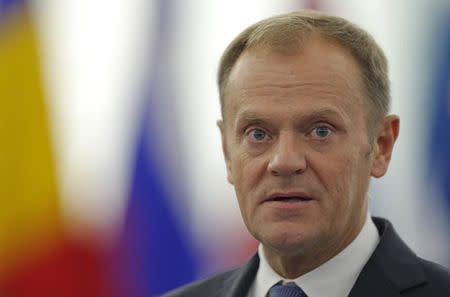Europe's 'race against time' on migrants leads to Turkey
By Alastair Macdonald VALLETTA (Reuters) - European Union leaders agreed on Thursday to invite Turkish President Tayyip Erdogan to a summit very soon as they seek his help to stem a chaotic flow of migrants that threatens Europe's unity and open borders. Donald Tusk, the European Council president who chaired the emergency meeting of EU leaders on Malta, warned that they must win a "race against time" to slow arrivals via Greece if Europe is to save the Schengen zone of passport-free travel inside the bloc from being throttled by new national barriers and controls. At the meeting, which followed a summit on the same topic with African counterparts, leaders were briefed on negotiations with Ankara the EU executive launched a month ago and gave the green light to wrapping them up. That could be completed at a summit in Brussels involving Erdogan and the 28 EU leaders, most likely late this month. Tusk was "99 percent sure" it would be at the end of November. Though many Europeans have qualms about giving too much to Erdogan when the EU is complaining of increasing human rights abuse in Turkey, his party's sweeping victory in an election last week has strengthened his hand to make demands on Western neighbours whose fate he largely holds in his hands. On offer are 3 billion euros ($3.2 billion) to help Syrians in Turkey, a broadening of Turkey's long-stalled EU membership talks to include economic policy and, critically for many Turks, more visa-free travel to Europe. In return, the EU wants Turkey to improve conditions for Syrian refugees and curb transit by Asians seeking to reach Europe in the hope of better paid work. EU-TURKEY SUMMIT Though Turkish officials play down its importance, European diplomats say organising a summit-level platform for Erdogan to meet his EU counterparts has been an important element in talks. They see the president intent on international recognition and respect at a time when his rule faces heavy foreign criticism. Greek Prime Minister Alexis Tsipras, whose country has been overwhelmed by over 600,000 migrants reaching its islands from Turkey on their way to Germany and northern Europe, said it was clear the EU's salvation lay with Turkey, a NATO ally and would-be first Muslim member of the European Union. "It is obvious that the only real chance of stopping these flows," he said, "is reaching an understanding with Turkey." Though details have yet to be finalised, German Chancellor Angela Merkel said there was consensus on the 3 billion euro offer for the next two years to improve conditions for the more than 2 million Syrian refugees in Turkey. The executive Commission proposed paying 500 million euros from the EU budget and asking member states for the rest. Merkel said that precise budgeting was yet to be done and diplomats said several governments had reservations about contributing. The EU-Turkey summit would, Merkel said, "demonstrate that we will work very closely with each other and that we sensibly share out the challenges arising from the civil war in Syria". Lebanon and Jordan, also hosting large numbers of refugees, would also be considered for more EU assistance, officials said. Tusk and Commission President Jean-Claude Juncker will meet Erdogan and Prime Minister Ahmet Davutoglu on Monday to pursue the negotiations during the G20 summit in Turkey. "RACE AGAINST TIME" EU leaders also urged each other to speed up implementation of measures agreed, some only after bitter disputes, over the past few months as close to a million migrants have arrived. Tusk, a former Polish premier who has sounded increasingly vocal alarms about the cohesion of the bloc, said tighter control of the external borders was essential. Citing Sweden's move to re-impose checks on arrivals from other EU countries and new measures in Germany and Slovenia, he said of the bloc's passport-free travel zone: "Saving Schengen is a race against time. And we are determined to win that race." "Without effective border control, the Schengen rules will not survive," he added. "We must hurry, but without panic." Ex-communist eastern states that have been among critics of Merkel's insistence on welcoming refugees in Germany announced they would provide a large contingent of border guards to meet demands of the EU border agency Frontex. A lack of response to a call for personnel has been among factors slowing plans to tighten checks on those arriving and to relocate asylum-seekers from Italy and Greece. However, Victor Orban, the outspoken right-wing prime minister of Hungary who was one of those contributing immigration staff was unrepentant in his view that Europe must crack down on all migration flows. "Migration is not a win-win situation ... but a lose-lose situation," said Orban, who fenced his borders after tens of thousands of refugees arrived from Greece via the Balkans. "We should change the language of discussions and not consider migration a positive thing because it is totally against the impression of the European citizens." (Additional reporting by Andreas Rinke in Valletta, Madeline Chambers in Berlin and Karolina Tagaris in Athens; Editing by Richard Balmforth)

 Yahoo News
Yahoo News 


